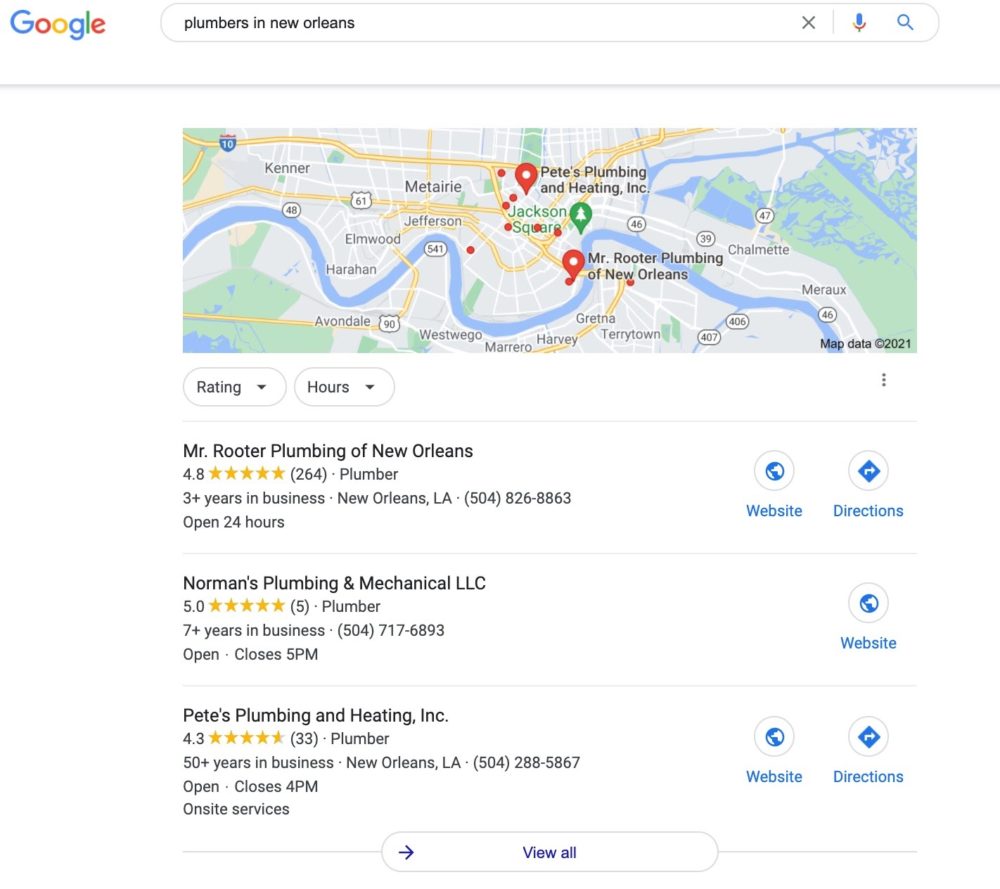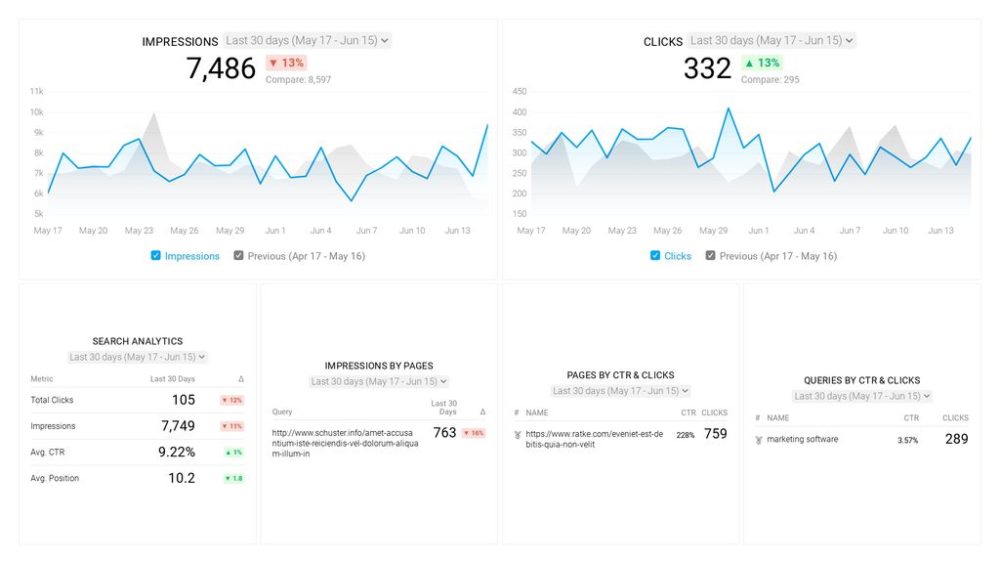Table of contents
Whether you are a plumber, a hair salon, or a local burger joint, you need to get the word out about your business.
And one of the most effective strategies to do this is through local SEO. It is all about getting your business top of mind when people are looking for a product or service similar to yours.
This often means creating listings – a.k.a. structured citations – in the places where your best-fit customers are most likely to turn to like Yelp, Foursquare, Google My Business, etc.
In this post, we’re sharing tips to help you build local citations for your business.
- What are citations?
- What is citation building?
- Types of citations
- How are citations helpful for local SEO?
- Tips for effectively building citations

What Are Citations?
A local citation is any online reference that mentions your business’s name, address, and phone number (a.k.a. NAP).
For example, if you are a plumber in New Orleans, one example of a local citation would be your Google My Business listing (GMB).

Local citations – like your GMB listing – are important because it helps potential customers find you when they are in an unfortunate situation like their septic system backs up.
What is Citation Building?
Savvy local businesses spend time building citations to increase their company’s reach and improve discoverability.
While there are many ways to build and track local citations, the preferred way according to the SEO professionals we surveyed is through local directories.

Types of Citations
There are two types of local citations: Structured and unstructured.
Structured citations are the listings you find in the big local and business directories. The biggest structured citation sources are: Google My Business, Facebook, Apple Maps, Yelp, and Bing.
On the other hand, unstructured citations are all other business NAP references, like local news mentions, event listings, guest posts, etc.
In terms of which one to prioritize, 70.2% of SEO professionals focus more time on structured citations.
How Are Citations Helpful for Local SEO?
As we alluded to earlier in this post, the biggest value of building local citations is to improve discoverability and generate more business.
For example, Branislav Kral of Chosen Data says, “Over the course of the years of doing SEO for local businesses with big websites, we’ve learned the value of covering 50+ citations, and of doing it great.
Some SEOs today say that local citations don’t make so much of a difference anymore, but our client data shows that it’s more about that the standard is high and most local businesses have local directories in good shape today. So, if you don’t, you’ll fall off the face of the Earth. If you do have them in good shape, you’ll meet the standard. If you have your local citations in great shape, via consistency in data combined with a high number of directories covered and rich content on those directories, you’ll stand out.
In our client practice, we put a lot of manual effort into Google My Business, both when we first set it up and every month. Then we subscribe to Yext and watch it closely, so that we end up with 100+ citations covered in a few months.
Then we build out rich content over the first half a year.
Eventually, we order a citations audit by Loganix, and get 20–30 more citations. About a year into that, for clients with stiff local competitions such as healthcare clinics, we also look into industry-specific and city-specific directories. If nothing else, we get a set of relevant backlinks that way. And throughout the time, we keep citations alive by creating a system for generating reviews, and by posting regular GMB posts.
The benchmark for local citations is high. You don’t want to mess around. You want to do it great. Get the right tools for the job, you’ll get there much faster than you ever could if you were to do it all manually.”
Tips for Effectively Building Citations
In addition, here are some curated tips to help you build more citations for your local business.
- Make an industry-specific list
- Focus on quality citations NOT quantity
- Be consistent
- Automate the tedious parts
- Reverse engineer your competitors’ citations
- Be thorough
- Create a directory page on your site
- Sponsor local charities and teams
- Research local business initiatives
PRO TIP: How to Analyze Your Best Pages for SEO Performance
To optimize your website for organic search, you probably use Google Search Console to learn which pages receive the most impressions and clicks, and which queries are driving them. Now you can quickly assess your SEO performance in a single dashboard that monitors fundamental metrics, including:
- Which search queries drive traffic to my website?
- Which of my website pages generate the most impressions and clicks in search engines?
- What’s the average click-through rate (CTR) for our website pages in search?
- What’s the average position our website pages show up in search results?
- How many clicks have our website pages generated in search results this month?
and more…
Now you can benefit from the experience of our Google Search Console experts, who have put together a great Databox template showing the most important KPIs for monitoring organic search performance. It’s simple to implement and start using as a standalone dashboard or in marketing reports!
You can easily set it up in just a few clicks – no coding required.
To set up this Google Search Console Dashboard, follow these 3 simple steps:
Step 1: Get the template
Step 2: Connect your Google Search Console account with Databox.
Step 3: Watch your dashboard populate in seconds.
1. Make an industry-specific list
The businesses that excel at local SEO also tend to be the most strategic.
“Make a list of all the citation opportunities you have that are specific to your industry,” says Tori Bell of Clever Touch Marketing. “Ask your colleagues what magazines they get and what conferences they attend, this can help build your list. These opportunities will then help to establish your business in the industry and get in front of a relevant audience.”
William Munir of Grooming Hut says, “Industry journals, professional associations, and conferences with sponsors (or who want to highlight key speakers or attendees) often have sections on their websites where related companies can be listed. To start creating a list of magazines to pursue citations, ask colleagues in your office what magazines they get or what conferences they attend. These citation opportunities are crucial because they not only get your name in front of a highly influential audience, but they also help to build your company as an industry authority.”
Daniel Foley of Litta adds, “Look for citation opportunities on local websites. Local businesses are often promoted by a city’s Chamber of Commerce or other locally oriented organizations. Look for websites that have listings and post your details there. This can be particularly useful in reinforcing your reputation as a community-based local business (to potential customers and search engines).”
This is in addition to the bigger directories that everyone knows and uses like Google My Business (GMB), BBB, and Yelp.
Rachel McMahon of Anvil Media adds, “Focus your attention on the priority citation platforms like Google My Business, Bing Places, Yelp, BBB, and Apple Maps. Ensure these are as fully optimized as possible while also regularly monitoring and updating when needed.”
In addition, you can also rely on tools like SEMrush’s local SEO tool to fill any gaps.
Katherine Garratt of Superfast IT explains, “We used SEMrush’s local SEO tool, which highlighted a tonne of online directories that we weren’t already included in.
I would also recommend Googling your service and location to see if there are any directories that get top results.
You can then spend more time and effort to build a complete profile, adding case studies, etc. to those top-performing directories.
Always update your Google business account. Add a new post, image, or video to your business profile every week ideally. We’ve found that this makes a huge difference.”
2. Focus on quality citations NOT quantity
One way to be strategic is to avoid “spray and pray tactics.” Just because you can submit your site to hundreds or thousands of directories doesn’t mean you should.
“Make sure you assess the citation for quality,” says Steven Jaenke of Digimark Australia. “Just because you can submit your business’s name, address, phone number, and website, doesn’t mean that it is worth you submitting your details. The higher the quality, the better the citation. In saying that, if it’s a hyper-local directory that’s in your city, that’s probably worth getting.”
Alexi English of Hurrdat Marketing agrees, “Don’t spend all your time building new citations in irrelevant directories. Make sure your business is listed correctly in the top directories, search engines, and maps such as Google, Apple Maps, Bing, Facebook, Yelp, etc. Focus on the top 25-50 and then move on to other initiatives.”
3. Be consistent
“Consistency,” says Dan Young of Loud Digital. “Make sure every listing has the same consistent information across all websites, this has led us to great success with local SEO.”
While all of your information should ideally be accurate and up-to-date across all of your citations, the most important thing to get right is your business name.
Tim Absalikov of Lasting Trend shares: “The first thing in citation building to care about is business information. It should be full and accurate. Always include the correct postal code, phone, operating hours, photos, and services you offer. Don’t forget that people can find a business on Maps or through Yelp. Correct local citations can impact your ranking in a specific area as well.”
4. Automate the tedious parts
The process of building local citations is time-consuming. Smart SEO pros build processes and automate the most repetitive tasks.
“Use an aggregator tool to upload all of your citations for you manually – there are 100’s of relevant sites that need this information from directories to review sites, so having an automation tool take all of the hard work off you will save you lots of time and ensure your data is circulated as wide as possible,” says Jenna Carson of Music Grotto.
For example, Niles Koenigsberg of Real FiG Advertising + Marketing says, “Save yourself some time by using a citation-building tool like BrightLocal! We just started to use this tool at our digital agency this year and it has been a game-changer. While this tool requires paid credits, it greatly simplifies the citation-building process as it will gather a report of your current listings and identify key opportunities for where to create citations for your business.
When you use those paid credits, BrightLocal will work to update those local citations across all kinds of platforms to make sure your business information is consistent, up-to-date, and fully optimized with keywords.”
Liam Taft of TwinklHive adds, “If you work for an agency where you’re building local citations for several clients, ensure you have a process in place to make this as efficient as possible. Add all relevant directories into a spreadsheet, and highlight those will follow-links, a high domain authority, and which take less than 15 minutes to complete. You don’t want to waste time on directories that won’t provide any value. By filtering out directories that are overly complicated to fill out, or contain spam content, you can focus your attention on building high quality citations as quickly as possible.”
5. Reverse engineer your competitors’ citations
One popular tactic is to study your competitors’ keywords and links to find new opportunities.
Jesse Heredia of Ravecode Solutions says, “Review your top 5 competitors and take note of which local directories they are part of and plan to also create a profile in those directories. A simple Google search for their business name should uncover all of the platforms they are featured on, or you can also use tools like SEMrush to gather more information.”
Kristina Witmer of Witmer Group explains, “A great trick to find low hanging fruit (high powered citations) that can help boost your local SEO is to take the URL of the website of your competitors and run it through a Google search. Go as far back as 5 pages and look for various local citations. If Google ranks these citations well for the URLs of your competitors, it means they think it’s a relevant and powerful citation.”
In addition, Devin Ahern of Mid Florida Material Handling adds, “Run a backlink analysis on your biggest competitors and identify which citations they have. These should be the citations you start with.”
6. Be thorough
When you fill out information, make sure to include all relevant, up-to-date information.
“The best tip for citations is to keep all business information accurate and to completely fill out as much information as the citation site let’s you,” says Joe Lawlor of Digital Dynasty. “The key to getting maximum SEO benefit from citation building is to use citations as if they only have one function:
To validate the local business in a way that search engines can see it’s an established company with up to date information online.
Looking at citations in this way will help you avoid mistakes that can heavily damage your local SEO exposure such as keyword stuffing or using keyword anchor text to link back to the company website. All of the information you submit on each listing should simply be the accurate information – nothing more, nothing less. If you have an address to use, make sure you’re using it the same way across the board.
Don’t just submit city name by itself.
Don’t include the city name in the business name just use the exact business name of the company.
If you add LLC to the name, make sure you do that on each and every citation that goes live.
It’s all about keeping the information the same and submitting as much of it as possible so search engines can see there are many websites online that are in agreement that this local business is indeed located at this place and is open at these times, etc. This way, the rest of your SEO efforts will work in tandem with the citations to power up the legitimacy of the business. Search engines like Google will give preference to local businesses that give them more reasons they can be trusted; most noticeably resulting in ranking higher in the maps section.”
7. Create a directory page on your site
Jeremy Cross of Team Building Seattle recommends, “An easy way to create more local citations is with a directory page on your site. You can make a list of “the 10 best event venues in Seattle”, for example. Then, reach out to the businesses you featured, and ask if they will link back to the post. This cold outreach is a relatively easy ask, since you’ve already highlighted their business and provided some benefit to them. You can also do a more traditional directory that includes many businesses in the area.”
8. Sponsor local charities and teams
If you are open to pay-per-play opportunities, sponsoring a local charity or sports team can be a great way to acquire a link and also give back to your local community.
“A less common method for acquiring citations to boost local SEO is sponsorship,” says Gavin Kane of Hunter Coast Painting. “Sponsor a local team, a charity, a podcast in exchange for a (dofollow) link. Not only will you be providing support to people who may need it, but you’ll also be engaging with your local community which can bring you more value than a citation over time.”
9. Research local business initiatives
Whether it is local news initiatives or new business partnerships, getting more active in your community can help you spot new link-building opportunities.
Connor Hewson of Assured Marketing says, “The best citation building tip I have for local SEO is to investigate options surrounding local business initiatives that are being run by a local authority. schemes like the Local Enterprise Partnership (LEP) will often publish content free of charge on blogs regarding news from local SMEs. Getting citations featured on these trusted sites is a great way in order for a new website to begin building their authority on Google for ‘near me’ and other localized search terms.”
While there is no one-size-fits-all local SEO approach, investing some time in building more structured and unstructured citations can go a long way to improving discoverability.
To measure structured citations in an SEO reporting tool, you can use a third-party tool like Moz Local or BrightLocal to track your business’s citations across the web. Both of these tools offer integrations with Databox, which means you can easily pull in your citation data and visualize it on a dashboard.















